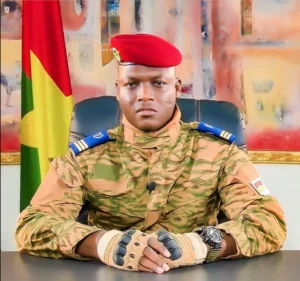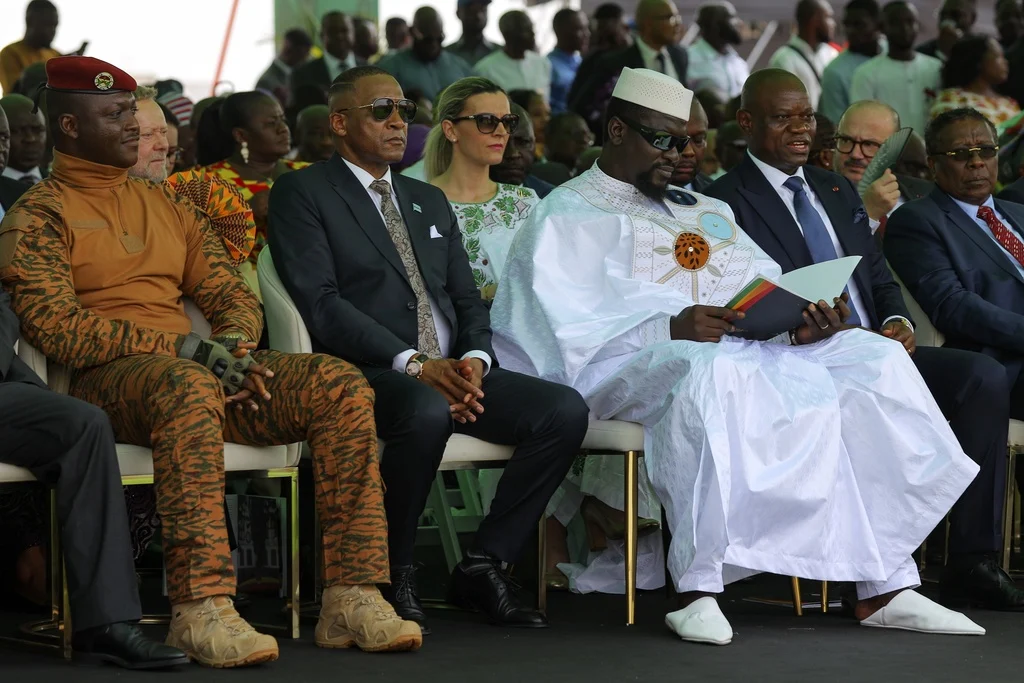|
|
Burkina Faso’s President Ibrahim Traoré, left, with Botswana’s President Duma Boko, and Guinea’s President Mamady Doumbouya, seen among the guests attending Ghana’s President John Dramani Mahama’s inauguration ceremony, at the Independence Square in Accra, Ghana, Tuesday, Jan. 7, 2025. (AP Photo/Misper Apawu)
Burkina Faso, a West African nation facing years of violence from armed extremist groups, is currently governed by a military leader, Captain Ibrahim Traoré, who came to power in a 2022 coup. In May 2024, his government announced it would remain in control for five more years, delaying elections and extending its transitional rule. Supporters within the country say Traoré is standing up to foreign influence and working to address long-standing issues like insecurity and poverty. However, critics—especially in Europe and the United States—have raised concerns that the move undermines democratic values. Burkina Faso is not alone: alongside Mali and Niger, it is now part of a regional alliance that aims to resist what its leaders call ‘neocolonial interference’ from powerful outside nations.
Junta Extends Rule to 2029
A national consultation in Ouagadougou adopted a revised transitional charter, allowing Traoré and other military leaders to remain in power until at least 2029 (Reuters). The updated charter also removed a clause that previously barred junta members from running in future elections, opening the door for Traoré to seek the presidency while still in office.
Traoré, 36, took power in a September 2022 coup—the second in less than a year—citing the government’s failure to curb escalating jihadist violence. His administration argues that the extension is necessary to stabilize the country and implement deep reforms before handing back power to civilians.
“We are building a foundation for true sovereignty,” Traoré told attendees during the transition announcement, urging international patience (Reuters).

This past April 2025, Traore said, “We are not in a democracy. We are in a progressive people’s revolution.” Traoré emphasized Burkina Faso’s shift away from Western democratic models towards a system rooted in local values and revolutionary ideals as reported by Sahel liberty news
Support and Criticism
In the weeks following the extension, tens of thousands rallied in Ouagadougou and other cities in support of the military leadership. Protesters waved the flags of Burkina Faso, Mali, and Niger, voicing opposition to Western influence and support for African-led solutions (AP News).
Still, international organizations, including the United Nations and the U.S., have expressed concern. They warn that the country is drifting away from democratic norms, such as holding transparent elections and protecting press freedom. Human rights groups have also documented reports of civilians being harmed by state forces during counterinsurgency operations (AP News).
U.S. Allegations and Regional Response
In April 2025, U.S. General Michael Langley accused the Burkinabè government of using national gold reserves to prop up military rule (AP News). Many in Burkina Faso viewed the accusation as politically motivated, fueling anti-American protests in Ouagadougou.
These protests reflected deeper frustrations. For many citizens in Burkina Faso and neighboring countries, such criticism underscored a broader desire for economic self-determination—the ability to control their own resources and political future without foreign interference.
Rising Pan-African Sentiment
Burkina Faso’s path under Traoré aligns with a wider movement in the Sahel. In September 2023, Burkina Faso, Mali, and Niger formally withdrew from the Economic Community of West African States (ECOWAS), citing unfair sanctions and foreign bias toward civilian governments. The trio then launched the Alliance of Sahel States, pledging to cooperate on military, political, and economic fronts (Reuters).
Across Africa, leaders and youth movements have drawn inspiration from revolutionary icons like Thomas Sankara and Kwame Nkrumah, advocating for a multipolar world where Africa is not dependent on any single bloc of powers.
In Ouagadougou, celebrated Burkinabè architect Francis Kéré is building a mausoleum to honor Sankara, who was assassinated in 1987. The project, endorsed by Traoré, is intended to inspire national pride and historical reflection (Designboom).
Regional and Global Watchfulness
As the Alliance of Sahel States steps away from traditional alliances with France, the EU, and ECOWAS, it is pursuing new ties with Russia, China, and other non-Western powers. Some observers view this as a pragmatic effort to diversify foreign partnerships, while others warn that it may fuel new tensions in an already fragile region.
Neighboring governments are paying close attention. In Nigeria, authorities recently arrested several activists who attempted to organize a rally in support of Traoré—a sign of concern that his growing popularity could spread across borders (Sahara Reporters).
Looking Ahead
Captain Ibrahim Traoré remains a highly visible and polarizing figure on the African continent. He is praised by supporters as a bold, anti-imperialist reformer and criticized by others as a military strongman eroding democratic safeguards. As Burkina Faso settles into a longer phase of military-led transition, the actions of the Alliance of Sahel States, and how the international community engages with them, may significantly shape West Africa’s future.








